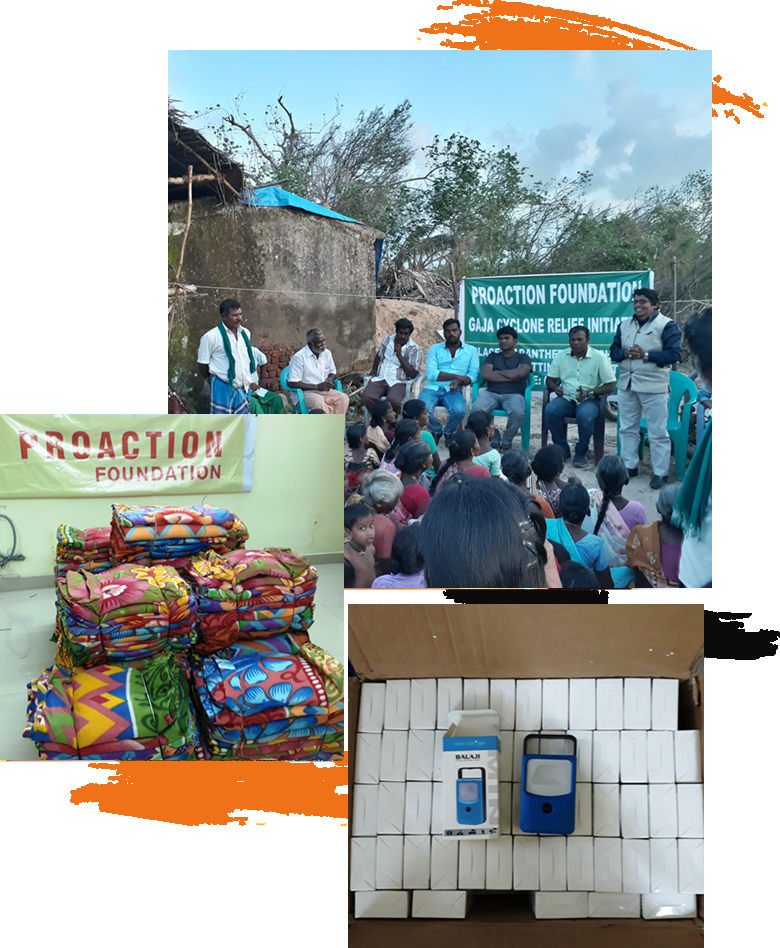Emergency Response
‘By failing to prepare, you are preparing to fail’
The poor are always vulnerable, marginalized, voiceless, and victims of multiple social circumstances in India. The complex vulnerable existence always made these poor suffer and become double victims of any disaster - natural, human‐made, or biological like the Covid-19 pandemic. Poverty in India is also the result of several complex social realities, historical past, and present doldrums.
PAF has set up a mechanism to respond to sudden emergencies affecting the targeted women and their families as during that time a family gets trapped by moneylenders or take wrong decisions under intense pressure. This activity aims to improve the overall well-being of targeted women and their family members in case they face an emergency. Often, if an emergency occurs within a household where people are socio-economic vulnerable, it is more difficult to absorb the shock and it is more likely that the members resort to negative coping strategies (debt, selling family assets, etc). Sometimes, depending on the severity of the shock, there can be consequences for the mental well-being of family members. The other common issues faced by slum dwellers are when the area where they live comes under flood, a fire breaks out in the house, a family member gets detected for some serious illness, and some sort of accident happens with a family member.
To provide much-needed support in an emergency, a well-thought contingency plan has been developed with the participation and consultation of all concerned stakeholders. At any time, if a woman or her family faces an unplanned situation then timely required help and support are provided to her and her family members as this help the woman and her family members avoid coming under the trap of moneylenders or other anti-social elements.
In India, tropical cyclones are one of the common hydro-meteorological hazards. Owing to its long coastline, high density of population, and a large number of urban centres along the coast, tropical cyclones over time are having a greater impact on the community and damage the infrastructure. In addition to this, climate change is warming up oceans to increase both the intensity and frequency of cyclones. Cyclone Gaja was one of the major cyclones to hit the Tamil Nadu coast in November 2018. It left a devastating tale of destruction on the cyclone path damaging houses, critical infrastructure for essential services, uprooting trees, affecting livelihoods, etc in its trail.
Coastal areas are densely populated due to the availability of a variety of livelihood options, rapid economic growth, and coastward migration. Most of the world’s megacities are located in the coastal zone and many of these are situated in large deltas, where combinations of specific economic, geographic and historical conditions to date attract people and drive coastal migration. Thus, disasters in coastal areas impact more population and lead to greater economic loss.

The damage caused by the Gaja cyclone was devastating, it claimed 63 lives (as per State Govt.), leaving 12, 298 cattle dead, damaging nearly 278, 824 houses completely, roofs of 62, 996 huts were either fully or partially damaged, and uprooted 1,132,686 forest and fruit-bearing trees, that was the source of livelihoods of many agricultural labourer and small farmers. The main affected areas were Nagapattinam, Tiruvarur, Thanjavur, Pudukkottai, Dindigul, and Trichy of Tamil Nadu and Karaikkal of Puducherry.
Many NGOs came with support to save the survivors from hunger and death. Proaction Foundation also wanted to engage and help the affected people and for the same, it took help of a local NGO called St. Jeorge Antony Trust in Karaikal and collected the required information. It organized a small fundraising event in Chennai and procured materials like food kits, hygiene kits, etc, and distributed to 134 affected families (most of them were from Schedule Caste) in two areas Thoppadi Theru and Karuvaludi Theru of Kadanthethi village under Kadanthethi Panchayat of Nagapattinam District. After receiving relief materials, beneficiaries were very happy as many of them had not received any support till now and Proaction Foundation was the first NGO to approach them with relief materials.
